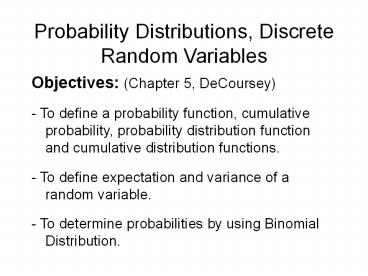Introduction to Differential Equations - PowerPoint PPT Presentation
1 / 10
Title:
Introduction to Differential Equations
Description:
Probability Distributions, Discrete Random Variables Objectives: (Chapter 5, DeCoursey) - To define a probability function, cumulative probability, probability ... – PowerPoint PPT presentation
Number of Views:244
Avg rating:3.0/5.0
Title: Introduction to Differential Equations
1
Probability Distributions, Discrete Random
Variables
- Objectives (Chapter 5, DeCoursey)
- - To define a probability function, cumulative
probability, probability distribution function
and cumulative distribution functions. - - To define expectation and variance of a random
variable. - - To determine probabilities by using Binomial
Distribution.
2
Probability Distributions, Discrete Random
Variables
Probability function Consider a random
discrete variable, X, which can only take on
certain values within an interval of interest,
such as x0, x1, x2, xk, The corresponding
probabilities are p(x0), p(x1), p(x2), p(xk).
Then p(xi) (i0,1,k) or PrXxi is called a
probability function.
3
Probability Distributions, Discrete Random
Variables
Probability Function The graph or table
listing the various values of p(xi) is the
probability distribution function for the
variable x. (e.g. tossing 2 fair coins)
p(xi)
X, no. of heads Probability, p(x)
0 1/4
1 2/4
2 1/4
Total 1
0.75
0.5
0.25
0
1
2
X
4
Probability Distributions, Discrete Random
Variables
Cumulative Probabilities X random variable, x
upper limit
Sometimes it is useful to know the probability
that a variable will take on a value below some
upper limit. Cumulative probability can be used.
5
Probability Distributions, Discrete Random
Variables
Cumulative Distribution Function The functional
relationship between the cumulative probability
and the upper limit, x.
PrXx
1.0
X, no. of heads Probability, p(x)
0 1/4
1 2/4
2 1/4
Total 1
0.75
0.5
0.25
0
0
1
2
6
Probability Distributions, Discrete Random
Variables
Expectation of a Random Variable is the mean
value of the distribution of the random
variable. It is an arithmetic mean that we can
expect to closely approximate the mean result
from a very long series of trials, if a
particular probability function is followed. The
expectation of a random variable X is denoted by
E(X) or µx or µ.
7
Probability Distributions, Discrete Random
Variables
Variance of a Discrete Random Variable
Standard Deviation
8
Probability Distributions, Discrete Random
Variables
- Binomial Distribution A special type of
probability distribution. It is applicable to
situations where - There are only two possible outcomes for a given
trial. e.g. heads or tails, good or bad, success
or failure. - The outcome is determined completely by chance.
- All trails have the same probability for a
particular outcome in a single trial. i.e. the
probability in a subsequent trial is independent
of the outcome of a previous trial. Let this
constant probability for a single trial be p. - Apply to quality control.
9
Probability Distributions, Discrete Random
Variables
Binomial Distribution Let p probability of
success q probability of failure 1-p
n number of trials r number of success
in n trials Then the probability of r successes
for n trials is given by the following general
formula
10
Probability Distributions, Discrete Random
Variables
Binomial Distribution Expectation
Standard deviation































